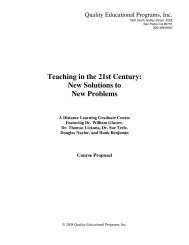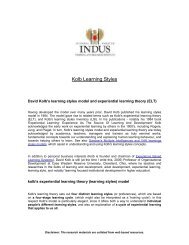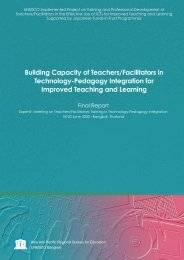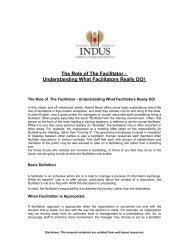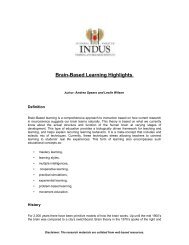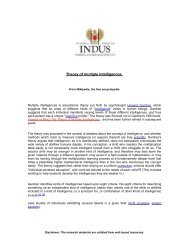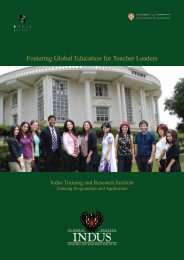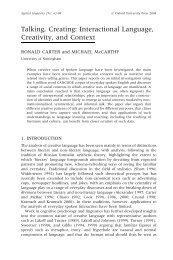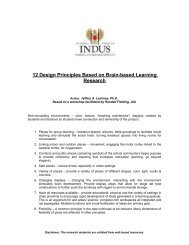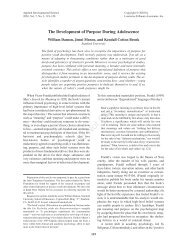Primary Years Programme Making the PYP happen - ITARI
Primary Years Programme Making the PYP happen - ITARI
Primary Years Programme Making the PYP happen - ITARI
- No tags were found...
Create successful ePaper yourself
Turn your PDF publications into a flip-book with our unique Google optimized e-Paper software.
<strong>Making</strong> <strong>the</strong> <strong>PYP</strong> <strong>happen</strong><br />
What are <strong>the</strong> beliefs and values that drive <strong>the</strong> <strong>PYP</strong><br />
The <strong>PYP</strong> aims to syn<strong>the</strong>size <strong>the</strong> best research and practice from a range of national systems with <strong>the</strong> wealth<br />
of knowledge and experience in international schools to create a transdisciplinary curriculum which is<br />
relevant, challenging and engaging for learners in <strong>the</strong> 3–12 age range.<br />
The driving force behind <strong>the</strong> <strong>PYP</strong> is a deeply held philosophy about <strong>the</strong> nature and future of international<br />
education, a philosophy which is expressed in <strong>the</strong> statements which follow. The first, <strong>the</strong> mission statement<br />
of <strong>the</strong> International Baccalaureate Organisation, expresses <strong>the</strong> IBO’s overall purpose as an organization.<br />
The second, Internationalism: <strong>the</strong> <strong>PYP</strong> perspective, sets out <strong>the</strong> <strong>PYP</strong>’s beliefs and values about<br />
internationalism as being defined by <strong>the</strong> nature of student learning in <strong>PYP</strong> schools. The <strong>PYP</strong> defines this<br />
learning through a student profile which encompasses <strong>the</strong> aims of <strong>the</strong> curriculum. The perspective goes on<br />
to identify elements in our schools which are worthy of our consideration as we strive to become ever more<br />
international. The third, Beliefs and values, from a language, a ma<strong>the</strong>matics, a science and technology and a<br />
social studies perspective, forms <strong>the</strong> vehicle through which <strong>the</strong> student learning outcomes are explored.<br />
The mission statement of <strong>the</strong> International Baccalaureate Organisation<br />
Through comprehensive and balanced curricula coupled with challenging assessments, <strong>the</strong><br />
International Baccalaureate Organisation aims to assist schools in <strong>the</strong>ir endeavours to<br />
develop <strong>the</strong> individual talents of young people and teach <strong>the</strong>m to relate <strong>the</strong> experience of<br />
<strong>the</strong> classroom to <strong>the</strong> realities of <strong>the</strong> world outside. Beyond intellectual rigour and high<br />
academic standards, strong emphasis is placed on <strong>the</strong> ideals of international understanding<br />
and responsible citizenship, to <strong>the</strong> end that IB students may become critical and<br />
compassionate thinkers, lifelong learners and informed participants in local and world<br />
affairs, conscious of <strong>the</strong> shared humanity that binds all people toge<strong>the</strong>r while respecting <strong>the</strong><br />
variety of cultures and attitudes that makes for <strong>the</strong> richness of life.<br />
Internationalism: <strong>the</strong> <strong>PYP</strong> perspective<br />
The <strong>PYP</strong> believes that <strong>the</strong> attempt to define <strong>the</strong> ideal of internationalism in ever clearer terms and <strong>the</strong><br />
struggle to move closer to that ideal are central to <strong>the</strong> mission of <strong>PYP</strong> schools.<br />
Given <strong>the</strong> complexity and variety of <strong>PYP</strong> schools and <strong>the</strong> abstract nature of <strong>the</strong> concept itself it would be<br />
naive to propose any simple definition and expect it to stand up to rigorous examination. Ra<strong>the</strong>r, <strong>the</strong> <strong>PYP</strong><br />
would suggest that any definition is likely to be compound, reflecting a range of interrelated factors. What<br />
<strong>the</strong>se factors might be is suggested later in this perspective.<br />
However, in examining <strong>the</strong>se factors during <strong>the</strong> years since <strong>the</strong> inception of <strong>the</strong> <strong>PYP</strong>, one aspect of <strong>PYP</strong><br />
schools emerges, not only as <strong>the</strong> most significant, but also as <strong>the</strong> common ground on which <strong>PYP</strong> schools<br />
stand, <strong>the</strong> essence of what <strong>the</strong>y are about: this is <strong>the</strong> kind of student who we hope will graduate from <strong>PYP</strong><br />
schools, <strong>the</strong> kind of person we would proudly call an internationalist.<br />
The <strong>PYP</strong> is suggesting <strong>the</strong>n, as central to its definition of an international education, <strong>the</strong> following student<br />
profile (figure 1). In so doing, <strong>the</strong> <strong>PYP</strong> is placing <strong>the</strong> focus of schools where it belongs, on student learning.<br />
The <strong>PYP</strong> is saying that schools should be proud to send out into <strong>the</strong> adult world students who exemplify <strong>the</strong><br />
qualities expressed in this profile. The <strong>PYP</strong> is conscious that this profile is value-laden and, it would say,<br />
© IBO 2000 3




